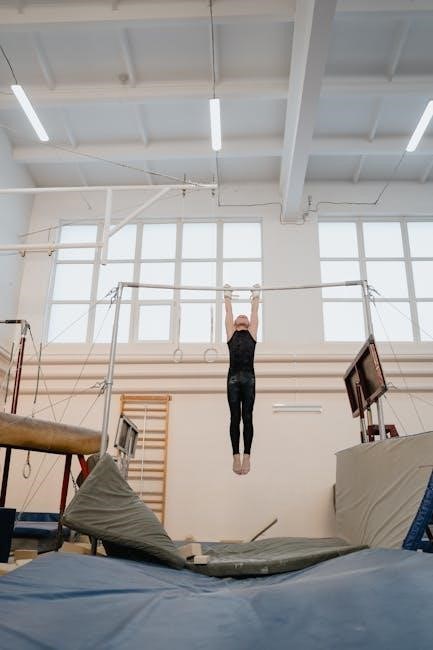Proper nutrition is essential for young athletes to support growth‚ energy‚ and performance. It helps optimize physical development‚ enhance endurance‚ and promote recovery‚ ensuring they reach their full potential.
Importance of Proper Nutrition for Growth and Performance
Proper nutrition is vital for young athletes‚ as it supports both physical growth and athletic performance. Adequate calorie intake ensures energy availability‚ while balanced meals provide essential nutrients for muscle repair and recovery. A well-nourished diet helps maintain focus‚ endurance‚ and overall health‚ allowing young athletes to perform at their best. Neglecting proper nutrition can lead to fatigue‚ poor recovery‚ and increased risk of injury‚ hindering both growth and athletic success. Thus‚ prioritizing nutrition is key for young athletes to thrive.
Key Objectives of Sports Nutrition in Youth
The primary goals of sports nutrition for young athletes are to fuel growth‚ optimize performance‚ and prevent deficiencies. Proper nutrition ensures adequate energy intake‚ balances macronutrients‚ and provides essential micronutrients. It aims to support muscle recovery‚ enhance endurance‚ and maintain overall health. Additionally‚ sports nutrition helps young athletes avoid the risks of inadequate nutrition‚ such as fatigue and poor recovery. By focusing on these objectives‚ sports nutrition fosters healthy habits and supports both athletic success and long-term well-being for young athletes.
Energy Requirements and Caloric Intake
Energy needs vary based on age‚ sport‚ and training intensity. Young athletes require sufficient calories to fuel growth‚ performance‚ and recovery‚ ensuring optimal energy balance for peak results.
Calculating Daily Caloric Needs Based on Age and Sport
Calculating daily caloric needs for young athletes involves assessing age‚ sport-specific energy expenditure‚ and training intensity. Athletes in high-energy sports like swimming or soccer require more calories than those in low-intensity sports like chess. Experts recommend using guidelines from organizations like the Canadian Paediatric Society or the International Society of Sports Nutrition to estimate needs‚ ensuring adequate energy for performance and growth. Personalized approaches are essential to optimize calorie intake effectively.
Understanding Energy Expenditure in Training and Competition
Energy expenditure varies widely among young athletes‚ depending on sport intensity‚ duration‚ and individual factors like age and metabolism. High-energy sports‚ such as soccer or basketball‚ require more caloric intake to replenish energy stores. Monitoring energy use during training and competition helps balance intake with expenditure‚ preventing fatigue and supporting performance. Coaches and parents should tailor nutrition plans to match these demands‚ ensuring athletes fuel adequately for optimal energy levels and recovery‚ especially in sports with high physical demands.

Macronutrient Balance for Young Athletes
A balanced intake of carbohydrates‚ proteins‚ and fats is vital for energy‚ muscle repair‚ and overall health‚ ensuring young athletes perform optimally and support growth.
Role of Carbohydrates in Energy Production
Carbohydrates are the primary energy source for young athletes‚ fueling both high-intensity and endurance activities. They are broken down into glucose‚ which powers muscles and brains. Complex carbs like whole grains and fruits provide sustained energy‚ while simple sugars offer quick bursts. Adequate intake prevents fatigue and maintains performance. The International Society of Sports Nutrition recommends 45-65% of calories from carbs‚ tailored to activity levels. Proper timing—before‚ during‚ and after training—optimizes energy use and recovery‚ making carbs essential for young athletes’ success.
Protein Requirements for Muscle Growth and Repair
Protein is vital for muscle growth‚ repair‚ and recovery in young athletes. It helps build and maintain muscle tissue‚ essential for performance and injury prevention. The recommended intake is 1.2–2.0 grams per kilogram of body weight daily‚ higher than for non-athletes. Sources include lean meats‚ fish‚ eggs‚ dairy‚ legumes‚ and plant-based options like beans and tofu. Timing matters—consuming protein within 30 minutes post-training aids recovery and muscle synthesis. Proper protein intake supports overall development and athletic success‚ ensuring young athletes meet their growth and performance needs effectively.
Importance of Healthy Fats for Overall Health
Healthy fats are essential for young athletes‚ supporting energy production‚ vitamin absorption‚ and hormone regulation. Sources like nuts‚ seeds‚ avocados‚ and olive oil provide omega-3 and omega-6 fatty acids‚ crucial for brain function and inflammation control. Including these fats in meals enhances nutrient absorption and supports overall health‚ aiding in recovery and maintaining optimal physical performance. Balancing healthy fats with other nutrients ensures young athletes meet their dietary needs for growth and sustained energy levels during training and competition.

Hydration and Fluid Balance
Proper hydration is vital for young athletes to maintain performance and health. Water and electrolytes help regulate body temperature and prevent dehydration‚ ensuring optimal physical function.
Water and Electrolyte Needs During Training
Young athletes require adequate water and electrolytes during training to maintain hydration and physical function. Water transports nutrients and removes waste‚ while electrolytes regulate fluid balance and nerve function. Intense exercise increases sweat‚ leading to electrolyte loss. Signs of dehydration include fatigue‚ dizziness‚ and dry mouth. Coaches and parents should encourage frequent water breaks and monitor hydration levels. Proper electrolyte balance prevents muscle cramps and maintains energy levels‚ ensuring optimal performance and recovery during sports activities.
Strategies for Optimal Hydration in Different Sports
Hydration needs vary by sport‚ intensity‚ and duration. Endurance sports like cross-country require consistent water intake‚ while high-intensity sports like football need pre-game hydration and regular breaks. Team sports‚ such as soccer‚ benefit from accessible water during games. Low-intensity activities‚ like chess‚ still require hydration‚ especially during long competitions. Tailoring strategies to specific sports ensures young athletes maintain performance and health‚ adapting to unique demands and environments while preventing dehydration and optimizing physical function.

Micronutrients and Their Role in Sports Performance
Micronutrients like iron‚ calcium‚ and vitamin D are crucial for energy production‚ recovery‚ and growth. They support immune function and bone health‚ preventing deficiencies that hinder performance.
Vitamins and Minerals Essential for Growth and Recovery
Vitamins and minerals play a vital role in young athletes’ growth and recovery. Iron supports oxygen transport‚ while calcium strengthens bones. Vitamin D aids bone health and immune function. Zinc and magnesium are crucial for muscle repair. Deficiencies can impair performance‚ so ensuring adequate intake through a balanced diet is essential. Supplements may be needed if dietary intake is insufficient. Proper levels of these micronutrients help young athletes recover faster and maintain optimal health for sports performance.
Preventing Deficiencies in Young Athletes
Preventing deficiencies in young athletes requires a well-rounded diet rich in essential vitamins and minerals. Iron‚ calcium‚ and vitamin D are often lacking. Encouraging varied food intake‚ including fortified foods‚ can help. Regular nutrition assessments and guidance from dietitians are key. Education for athletes and parents on balanced eating habits ensures long-term health and performance. Addressing gaps early prevents issues like fatigue and poor recovery‚ supporting overall growth and sports success.

Special Considerations in Sports Nutrition
Special considerations include age‚ gender‚ and growth stages. Adolescent female athletes need attention to iron and calcium intake‚ while eating disorders require early intervention. Personalized plans are crucial.
Nutrition for Adolescent Female Athletes
Adolescent female athletes require tailored nutrition to support growth‚ menstrual health‚ and performance. Iron and calcium are crucial for preventing deficiencies and supporting bone density. A balanced diet rich in lean proteins‚ whole grains‚ and healthy fats is essential. Hydration and electrolyte balance are vital‚ especially during intense training. Energy availability must be adequate to prevent issues like RED-S. Regular meals and snacks‚ along with education on body image‚ help promote a healthy relationship with food and their bodies‚ fostering long-term well-being and athletic success.
Addressing Eating Disorders and Body Image Issues
Eating disorders and body image concerns are prevalent among young athletes‚ often due to pressure to meet unrealistic standards; Early identification of warning signs‚ such as disordered eating or negative body perceptions‚ is critical. Education and open conversations with athletes‚ coaches‚ and parents can help promote a positive body image. Encouraging a balanced diet and healthy habits without stigma fosters a supportive environment. Addressing these issues is vital for both mental and physical well-being‚ ensuring athletes thrive holistically.
Supplements and Ergogenic Aids
Supplements and ergogenic aids aim to enhance performance but should complement‚ not replace‚ a balanced diet. Consult professionals to avoid risks like side effects or imbalances.
When Supplements Are Necessary
Supplements are necessary when young athletes have deficiencies or increased nutrient needs. They can address gaps in the diet‚ such as calcium or iron deficiencies‚ and support recovery during intense training. Supplements like protein powders or multivitamins may be beneficial for athletes with high energy expenditure or restrictive diets. However‚ they should only be used under the guidance of a pediatric dietitian or healthcare provider to ensure safety and effectiveness‚ as excessive use can lead to imbalances or side effects.
Risks and Side Effects of Common Supplements
While supplements can be beneficial‚ they may pose risks for young athletes. Excessive intake of certain nutrients can lead to imbalances or side effects like digestive issues. Some supplements may interact with medications or contain banned substances‚ potentially causing doping violations. Additionally‚ unregulated products may lack safety testing‚ especially in pediatric populations. It’s crucial for young athletes to consult with a pediatric dietitian or healthcare provider before using any supplements to avoid adverse effects and ensure safe‚ effective use.

Practical Nutrition Tips for Young Athletes
Focus on balanced meals‚ proper hydration‚ and timing to optimize performance. Avoid extreme diets and consult professionals for personalized advice to ensure safe‚ effective nutrition strategies.
Meal Planning and Timing for Optimal Performance
A well-balanced diet with carbs‚ protein‚ and fats is crucial for energy and recovery. Plan meals to fuel training sessions‚ ensuring a mix of complex carbs and lean proteins. Hydrate adequately before‚ during‚ and after activities. Avoid heavy meals close to training to prevent discomfort. Timing is key—eat a balanced meal 1-3 hours pre-training and replenish with a snack or meal within 30-60 minutes post-exercise. Consistency and variety ensure sustained energy and optimal recovery for young athletes.
Healthy Snacking Options for Busy Athletes
Healthy snacks are vital for young athletes to maintain energy levels between meals. Opt for nutrient-rich options like fruits‚ nuts‚ yogurt‚ or energy bars. Smoothies with fruits and milk provide essential vitamins and proteins. Whole-grain crackers with peanut butter or hummus are great for quick energy. Avoid sugary or processed snacks that cause energy crashes. Staying hydrated with water or electrolyte-rich drinks like coconut water is also crucial. These snacks support performance‚ recovery‚ and overall health while fitting into a busy schedule.
Proper sports nutrition is key for young athletes’ growth and performance. For further learning‚ explore resources like the Canadian Paediatric Society guidelines and expert recommendations from professionals like Paula Mrowczynski-Hernandez. Utilize tools like nutrition screening forms and educational booklets to support optimal athletic development and health.
Proper nutrition for young athletes involves balancing carbohydrates‚ proteins‚ and fats to meet energy needs. Hydration is crucial‚ with water and electrolytes essential during training. Timing meals and snacks around practices and competitions optimizes performance and recovery. Adequate vitamin and mineral intake supports growth and prevents deficiencies. Supplements should be used cautiously‚ only when necessary. Consulting healthcare providers and dietitians ensures personalized plans. Education and resources‚ like nutrition screening forms‚ help athletes and families make informed choices‚ fostering a supportive environment for optimal health and athletic success.
Recommended Reading and Tools for Further Learning
For further learning‚ resources like the International Society of Sports Nutrition position papers and the Canadian Paediatric Society’s nutrition guidelines are invaluable. Tools such as nutrition screening forms and meal planning apps can aid in practical application. Books on youth sports nutrition and online courses from reputable organizations provide comprehensive insights. Additionally‚ research papers and guides from experts like Paula Mrowczynski-Hernandez offer evidence-based strategies for optimizing young athletes’ diets and performance.
